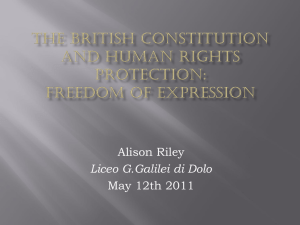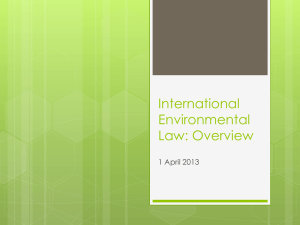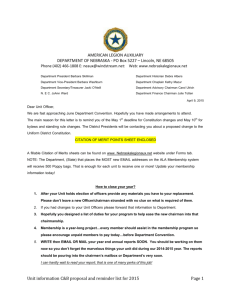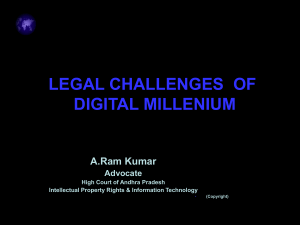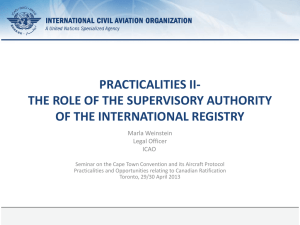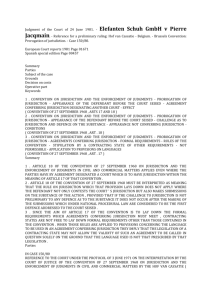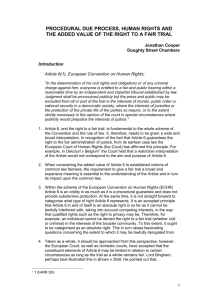The general principle
advertisement
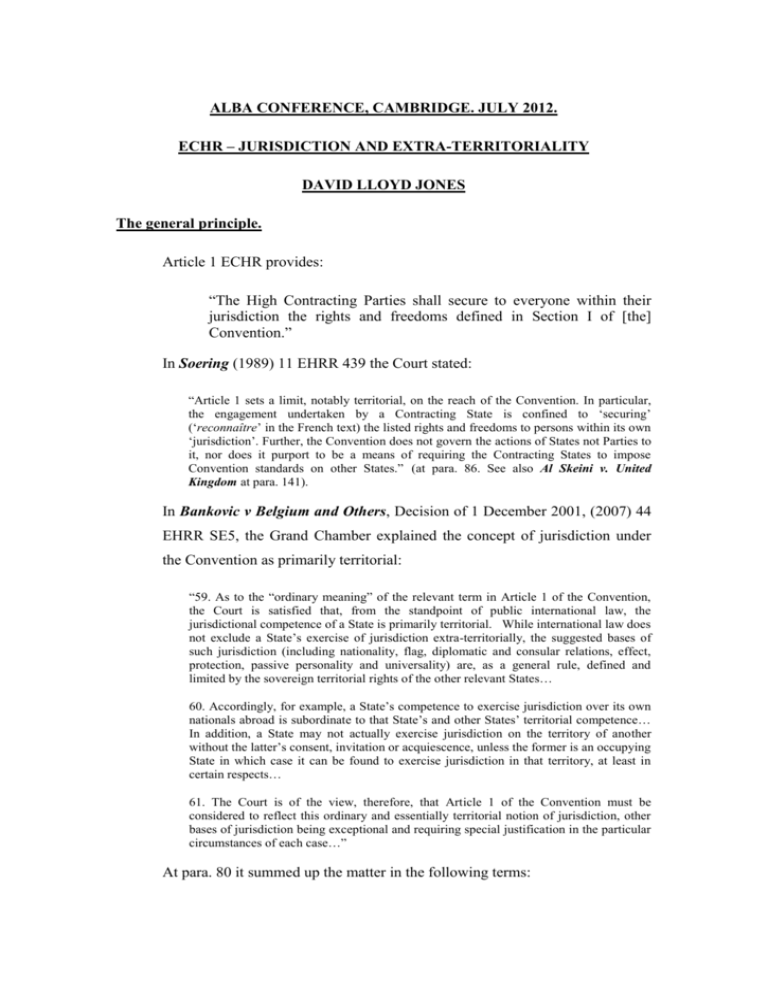
ALBA CONFERENCE, CAMBRIDGE. JULY 2012. ECHR – JURISDICTION AND EXTRA-TERRITORIALITY DAVID LLOYD JONES The general principle. Article 1 ECHR provides: “The High Contracting Parties shall secure to everyone within their jurisdiction the rights and freedoms defined in Section I of [the] Convention.” In Soering (1989) 11 EHRR 439 the Court stated: “Article 1 sets a limit, notably territorial, on the reach of the Convention. In particular, the engagement undertaken by a Contracting State is confined to ‘securing’ (‘reconnaître’ in the French text) the listed rights and freedoms to persons within its own ‘jurisdiction’. Further, the Convention does not govern the actions of States not Parties to it, nor does it purport to be a means of requiring the Contracting States to impose Convention standards on other States.” (at para. 86. See also Al Skeini v. United Kingdom at para. 141). In Bankovic v Belgium and Others, Decision of 1 December 2001, (2007) 44 EHRR SE5, the Grand Chamber explained the concept of jurisdiction under the Convention as primarily territorial: “59. As to the “ordinary meaning” of the relevant term in Article 1 of the Convention, the Court is satisfied that, from the standpoint of public international law, the jurisdictional competence of a State is primarily territorial. While international law does not exclude a State’s exercise of jurisdiction extra-territorially, the suggested bases of such jurisdiction (including nationality, flag, diplomatic and consular relations, effect, protection, passive personality and universality) are, as a general rule, defined and limited by the sovereign territorial rights of the other relevant States… 60. Accordingly, for example, a State’s competence to exercise jurisdiction over its own nationals abroad is subordinate to that State’s and other States’ territorial competence… In addition, a State may not actually exercise jurisdiction on the territory of another without the latter’s consent, invitation or acquiescence, unless the former is an occupying State in which case it can be found to exercise jurisdiction in that territory, at least in certain respects… 61. The Court is of the view, therefore, that Article 1 of the Convention must be considered to reflect this ordinary and essentially territorial notion of jurisdiction, other bases of jurisdiction being exceptional and requiring special justification in the particular circumstances of each case…” At para. 80 it summed up the matter in the following terms: “… In short, the Convention is a multi-lateral treaty operating, subject to Article 56 of the Convention, in an essentially regional context and notably in the legal space (espace juridique) of the Contracting States. … The Convention was not designed to be applied throughout the world, even in respect of the conduct of Contracting States. Accordingly, the desirability of avoiding a gap or vacuum in human rights’ protection has so far been relied on by the Court in favour of establishing jurisdiction only when the territory in question was one that, but for the specific circumstances, would normally be covered by the Convention.” R. (Zagorski and Baze) v. Secretary of State for Business, Innovation and Skills [2010] EWHC 3110 (Admin.). Even within the espace juridique of the Contracting States, Article 1 imposes important limitations on the applicability of the Convention. McElhinney v. Ireland and the United Kingdom [2001] ECHR 763. c.f. Charter of Fundamental Rights of the European Union, Arts. 51, 52. Exceptions to the general principle. The Court in Bankovic accepted certain exceptions to the territorial basis of jurisdiction which have been developed in the case law. Bankovic at para. 67. Al Skeini at para. 132. (a) Acts of diplomatic or consular agents. X v. Federal Republic of Germany, No. 1611/62, Commission decision of 25 September 1965. X v. United Kingdom, No. 7547/76, Commission decision of 15 December 1977. WM v. Denmark, No. 17932/90, Commission decision of 14 October 1993. (b) Acts performed with the consent or acquiescence of another State. Drozd and Janousek v. France and Spain (1992) 14 EHRR 745 (at para. 91). Bankovic at para. 71. R (Smith) v Oxfordshire Assistant Deputy Coroner [2010] UKSC 29; [2010] 3 WLR 223 per Lord Mance at para. 193. (c) Effective control of territory. Loizidou (Preliminary Objections) (1995) 20 EHRR 99. Loizidou v. Turkey (Merits) (1996) 23 EHRR 513. Ilascu v. Moldova and Russia (2005) 49 EHRR 1030. (d) Acts of State agents exercising physical power and control over the victim. Al-Saadoon and Mufdhi v. United Kingdom (Admissibility) (2009) 49 EHRR 1040. Medvedyev v. France [2010] ECHR 384, at para. 67. Issa v. Turkey (2005) 41 EHRR 567. Ocalan v. Turkey (2005) 41 EHRR 45. Al Skeini v. United Kingdom (2011) 53 EHRR 18: “The Court does not consider that jurisdiction in the above cases arose solely from the control exercised by the Contracting State over the buildings, aircraft or ship in which the individuals were held. What is decisive in such cases is the exercise of physical power and control over the person in question. It is clear that, whenever the State through its agents exercises control and authority over an individual, and thus jurisdiction, the State is under an obligation under Article 1 to secure to that individual the rights and freedoms under Section 1 of the Convention that are relevant to the situation of that individual. In this sense, therefore, the Convention rights can be “divided and tailored”.” (at paras. 136-7) In Al Skeini the United Kingdom contended that, with one exception, the acts in question took place in southern Iraq and outside the United Kingdom’s jurisdiction. In rejecting that submission the Grand Chamber stated: “ 149. It can be seen, therefore, that following the removal from power of the Ba’ath regime and until the accession of the Interim Government, the United Kingdom (together with the United States) assumed in Iraq the exercise of some of the public powers normally to be exercised by a sovereign government. In particular, the United Kingdom assumed authority and responsibility for the maintenance of security in South East Iraq. In these exceptional circumstances, the Court considers that the United Kingdom, through its soldiers engaged in security operations in Basrah during the period in question, exercised authority and control over individuals killed in the course of such security operations, so as to establish a jurisdictional link between the deceased and the United Kingdom for the purposes of Article 1 of the Convention.”




